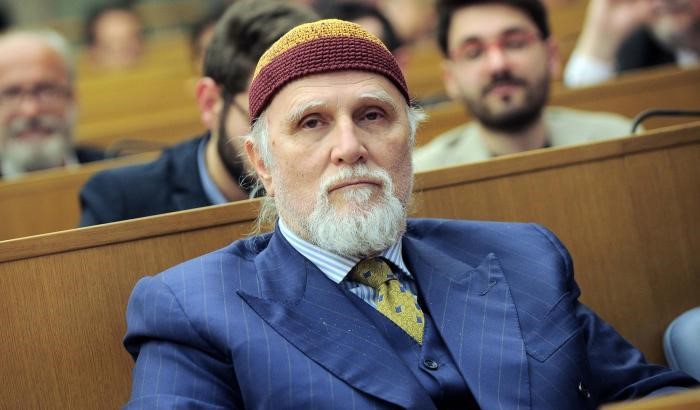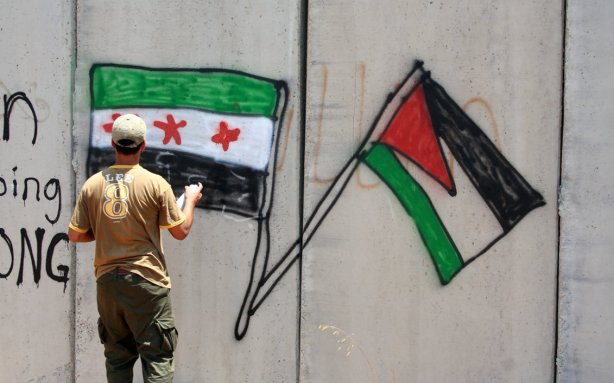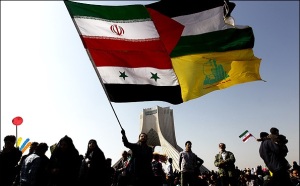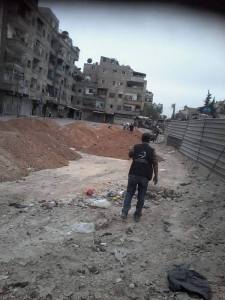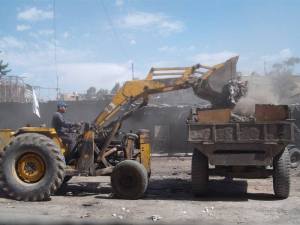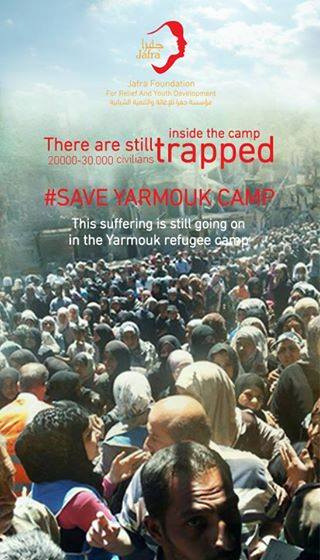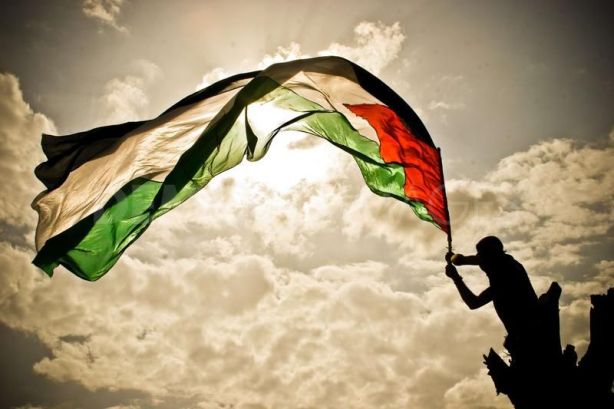Is this generalisation in fact harmful to the Palestinian cause?
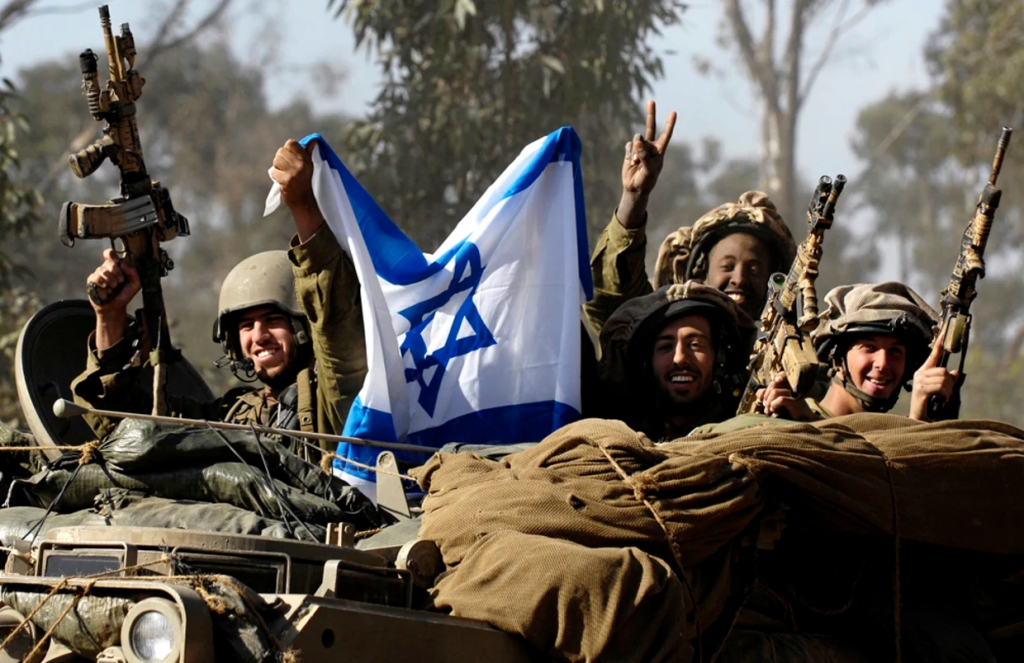
Written by Mary Rizzo. Reading an older article by Yassin al-Haj Saleh, (which is always a good thing to do, because the range of his knowledge and the clarity of his thought and expression are important instruments for people involved in human rights causes), something really hit me.
He writes (about the Syrian opposition to Assad): “From Cockburn, Chomsky borrows the notion of ‘Wahhabization of Sunni Islam’, which is a rash and irresponsible generalization, and that is why it is so useful for those who do not know and want others to think that they know.”
I read that a few times and thought about the incredible amount of times I’ve heard Syrian regime supporters say or write about Wahhabis being the opposition. And, while it is true that the longer the revolution dragged on without major inroads and with an opposition being for the most part without the same firepower to defend themselves, the more brutal the regime became. The increasing brutality of the regime could be the trigger of a more “radicalised” opposition that also found foreign support for its own ends, including fundamentalist religious ones, because there is much more at stake when the regime policy is not to merely “restore law and order” but to “burn the country” if Assad was not recognised as the legitimate leader of the country, as the motto of the regime forces went. The warriors on the other side of Assad also became radicalised because of the very kind of opposition forces that started to develop (pre-Isis) when Assad released “jihadists” from prison. They were never part of the opposition in the long history of political opposition, they were opportunists, and they jumped on an opportunity, chaos in the fog of war is an extreme opportunity…. So, this “Wahhabization of Sunni Islam” (if it is indeed a fact, and not just a quality of some of the jihadist forces) either has some actual reasons behind it, that regime supporters never will mention, all of them having to do with the actions of the regime, or it is merely the description of forces that have existed for a very long time in Syria and the region, at some level existing as a minority, as the Alawis or Druze are a minority in Syria (with the distinction that there is a local tradition with ethnic/cultural characteristics at some level of the latter two, which are not imported religious ideologies).
So, getting back to what Yassin wrote, it makes a lot of sense to me, even in the discourse of Palestine and Israel, to avoid using generalisations that won’t be provided with background, and I am going to go out on a limb here and say, not only in reference to the Israeli (and generally western) “tagging” Hamas as the real enemy of humanity and of Israel, but also with the concept of “Zionism” as the current ideology behind the invasion.
Israel excuses much of its invasion and destruction of Gaza with the insistence that their gripes are with “Hamas”, not with Palestinians. This can really confuse people who don’t know what Hamas is, how it came to power, how it remains in power in Gaza, and who are only aware of the condemnable acts of 7 October. Lots of soundbites came out in recent weeks about the “Hamas Charter” and its goal of “destruction of Israel”, even from commentators who should know better, because they are aware of the context and the historical development of the Charter. As regards the foundational document, Senior Hamas leader stated already in 2010 that the Charter “is a piece of history and no longer relevant, but cannot be changed for internal reasons.” Indeed, Hamas has “agreed to accept a final status arrangement, whether one or two states, so long as it is approved by a majority of the Palestinian population.” (quote from the same article). This important information is practically never stated by anyone on the media, and I doubt that those who have not followed the history and events of the region since the founding of the group in 1987 are even aware of it. However, they all do know that Hamas has been designated as a terrorist organisation by many countries, and practically the entire world condemns the kidnapping of Israeli civilians this past October. And the problem with all of that is the fact that one of the players in this war is either presented with no context at all, or with distorted context, and the other player is only depicted as reacting to a terrorist act, derived of the context as the narration is. In this case, the “rash and irresponsible generalisation” is extremely helpful to one of the players, who are granted carte blanche to carry out a relentless attack against all of Gaza, utilising every kind of weapon and even bombing civilian apartment complexes, hospitals, refugee camps and long-established UN buildings. One player has displaced an entire population under threat of extermination, which it is carrying out. There’s no actual “war against Hamas” as anyone can see, but a genocide against millions of people entrapped in an enclave without shelter, aid or relief. The number of victims is staggering, exceeding 14 thousand, and no less than 67% of them women and children! How is that a war against Hamas? It can only be called that by mislabelling a war and an enemy, repeating that they are the sole entity responsible for this turn of events and that this war is justified, while conducting a brutal war against the real enemy, Palestinians.
I will conclude this brief excursus by stating that I also think that the label of “zionist” may be misplaced and no longer is in the service of the cause of freedom and justice. Zionism is rarely understood by anyone who does not study the history of the region, except when it is applied as a slogan. Many years ago, roughly in 1999, involved in an online debate group on an interfaith forum about the Israel-Palestine conflict, it was one Israeli after another that insisted to anyone using the term, “we are not Zionists. We are Israelis. We don’t refer to ourselves as Zionists, also because we have achieved the goal of the establishment of the Jewish State.” I thought that it was an unsound argument, because, surely, I knew many “non-Zionist” Israelis who were great campaigners for the Palestinian freedom cause. How could I distinguish “them” from the ones who didn’t see any injustice in the displacement of Palestinians, in the settlements, in the separation wall, in the Gaza siege and in the checkpoints? To me, they were two completely different entities, whose beliefs were those that followed an ideology, and I wanted to be able to differentiate. If I believe that people should be addressed in the way they feel is proper, how come I couldn’t accept that these people who I “knew” to be Zionists, where just ordinary Israelis and not followers of an ideology?
The fact is, Zionism accomplished its goals. That was what was different. To keep calling them Zionists (which shouldn’t be an insult to them if they believe that the goal was ethical), was simply me being stuck in a period of history that had been and is gone. Could I call them “post-Zionists”? I asked. I was told that I simply did not, would not and could not understand modern Israel or the modern Israelis, (who, these debaters – at least 100 on that very active forum – admitted, rarely were in contact with Palestinians, unless they were working as domestic or construction workers). The majority of Israelis didn’t speak Arabic, didn’t engage socially with Palestinians and had never shared meals with any Palestinians. They considered them as hostile neighbours, but they were “there to stay”. According to this politically active sample, it was “already” an established fact that Israel was a completed project, a State that had been founded and was now “just like any other country” and the Palestinian lands were “already” established fact, but it was up to the Palestinians to be able to manage their affairs on their own, but so far, “they couldn’t”. These were all “two-State” supporters on that particular forum, and they were “just waiting for it to happen”. Needless to say the settlements “can be solved” was a frequent reassurance, as the debaters, felt that over time, things would simply settle down even as far as that was concerned.
I realised that here I was, someone deeply involved in the cause, (albeit, merely as a blogger, activist, translator, and supporter of the One democratic State option, barely ever on the table, in my mind, due to the power of Zionism, which demands separation and exceptionalism), but there was an impossibility of establishment of terminology that was acceptable, because to talk to “my side” the language was always about “zionists”, as we differentiated them from “Israelis” and “Jews”. The issue then was being able to present the reality to outsiders to open their eyes to the situation of the Palestinians not only in Gaza and the West Bank, but also those in Israel and in diaspora around the world. I wanted it to be understood that one side (the Israelis) had all the rights and wealth and international acceptance and then some, and the other side had suffered endless injustice and had no redress and everywhere were denied what was theirs, rights and freedom, as well as their land and homes. Politically, the Palestinians were only understood as (at best) incompetent and (at worst) terrorists.
Is the fact that most in opposition to the landgrab, arbitrary detention, oppression and war that Israel are continuing to engage in use “niche” terms defining themselves that 1) the public doesn’t understand, 2) most of the Israelis don’t even use, detrimental to communicating the reality of the ongoing horrors meted out to the Palestinian people by Israel with the complicity of most of the world?
Just as a phrase like “War against Hamas”, akin to the “Wahhabization of Sunni Islam” is misleading, without context and effective in shutting down discourse and investigation into the reality, a phrase used by “insiders” and also by the aggressor to keep the masses ignorant and misinformed… couldn’t “Zionism” also be such a phrase, since the internationally recognised and powerful Jewish State is a fait accompli? This is a question I ask myself, and will also attempt to move out of my vocabulary. What’s going on in Palestine now isn’t an action by some Zionists, striving to build a nation of Jewish sovereignty that doesn’t exist, it’s the policy of the entire State of Israel, based on the vital difference in value that they give to Jewish Israeli citizens as opposed to anyone else, at the cost of the total destruction of anyone else, under the banner of “bringing home” some Israeli citizens. Maybe we need to speak as simply as possible if we want to see an end to the suffering of Palestinians.
